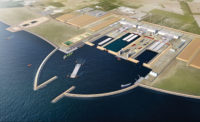
The fallout from a decline in oil prices has driven a recent decline in upstream oil-and-gas work for engineers and contractors. Still, big industrial projects continue downstream, and some contractors in some regions are hoping to take advantage of a glut of skilled labor.
Work along the Gulf Coast has already seen adjustments to lower oil prices, with large oil and gas projects shelved as their economics evaporated. Sasol Ltd. delayed a decision to invest in a $14-billion project next to an ethane cracker under construction in Lake Charles, La.,and other projects on the drawing board also are being put on hold.
"Anything tied directly to crude oil or direct derivatives, these projects have been pushed to the right and/or cancelled," says Robert Connors, engineering and construction analyst with Stifel Equity Research. "Anything upstream-related or oil-related is seeing capex cut, and anything LNG-related is being deferred and/or cancelled. The reason for including liquified natural gas is that, while natural gas may be attractively priced in the U.S., they're selling it to Asia, where it is pegged to oil prices."
On the industrial side, projects using oil derivatives haven't felt the worst of the drop in prices, and cheaper feedstock may actually bolster some projects. "You're not going to see any cancellations with the five big ethelyne-based crackers underway," says Connors. "But there's going to be less of a rush to build the next few."
Major downstream Gulf Coast projects that continue may see unexpected benefits from a slowdown in oil-and-gas exploration. "You're going to see craft labor rates in the Gulf Coast start to relax and start to help on project economics. A lot of guys from the oil patch are going to be out looking for work," says Connors.
"There is a shock value that happens," he says. "When oil gets cut in half, the first reaction from clients is, 'Let's wait to see volatility out.' There is definitely a heightened caution across the industry."
Far upstream, in the oil and gas fields of Colorado, the drop in prices has slowed work for oil-service engineering firms. The number of oil rigs operating along the Front Range of the Rockies has dropped by a third, to 44, in the past five months, according to Baker Hughes, an oil services company. The nine major drillers in the area have cut spending by nearly 30%.
But Colorado is a hot market that is only starting to cool. It's likely the slowdown hasn't been felt in the state yet because there was already so much work out there, says Scott Merritt, director of communications for the Rocky Mountains Chapter of the Associated Builders and Contractors. "Most of the contracting firms that do oil-and-gas work also have a pretty diverse client base," he notes.
Glenwood Springs, Colo.-based H-P Geotech says the slowdown has actually helped the geotechnical services firm by making more engineering talent available to hire. "A young engineer in California had turned down our job offer, then came back recently after he was laid off from his oil-and-gas job and said he was available. That helps with our labor shortage issues," says Steve Pawlak, firm president.
Across the country, in the shale plays of Pennsylvania, oil-and-gas engineering firms that saw tremendous growth in recent years are starting to feel the pullback. "In this environment, with the clients facing those contractions, they are looking for concessions from their suppliers," says Jim Rodgers communications director for Enola, Pa.-based Dawood Engineering, which does most of its work in midstream and pipelines. "Trying to keep people busy while maintaining profitable work, that's a double whammy. The pie is getting smaller. So, firms are asked to work for a lower price."
Rodgers expects his firm will feel the price drop eventually. "The easiest thing to slow down is new exploration … and that's where we do see the budgets are [being] cut," he says. "But there is still so much volume of work, between what's new and what's been re-permitted. There's still plenty of work to be done."





